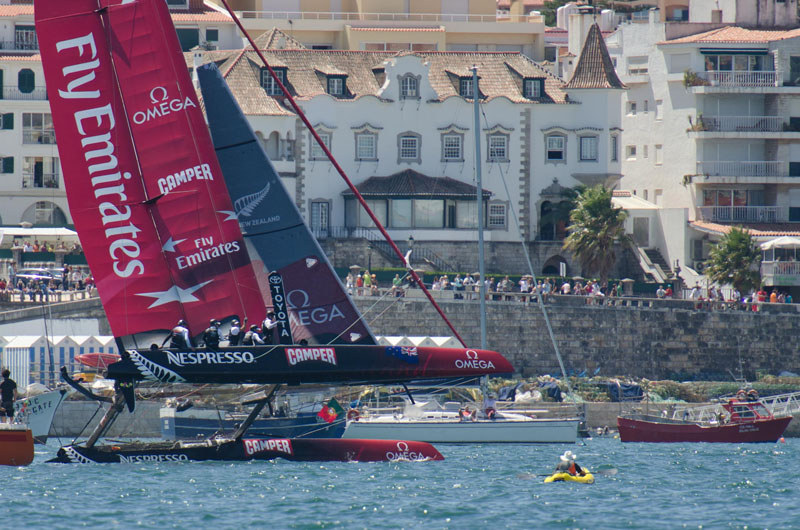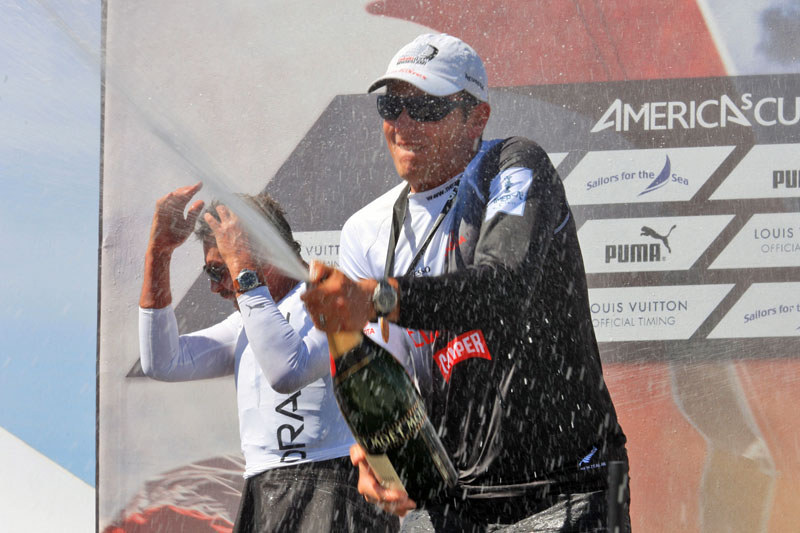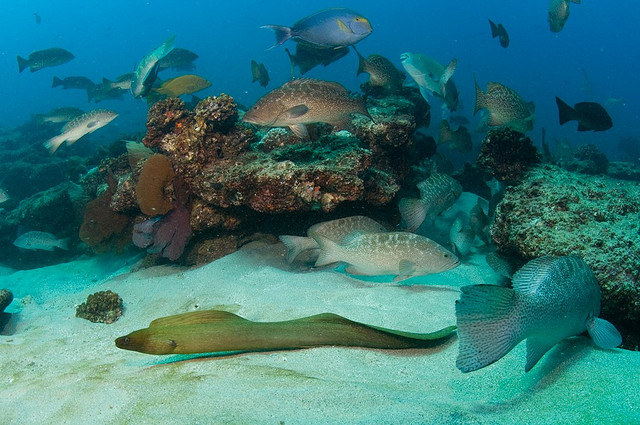
A Kid with Good Taste
We love it when parents instill good taste in their kids, as Ventura’s Mark and Laurie Matthews have done with their newest crewmember. "Just wanted to let the good folks at Latitude 38 know that the crew devoured last month’s issue," write the couple. "Here’s Alia aboard our 35-ft Chris Craft S&S designed Althea on baby‘s first trip out to Santa Cruz. Morale was kept at an appropriate level!"
Alia looks quite satisfied munching on the mag so it must not taste too bad. Hmmm, we are getting a little peckish. Maybe just a nibble . . . .
ACWS Cascais Wraps Up

Emirates Team New Zealand proved to be the class of the first ever America’s Cup World Series event in Cascais, Portugal, which wrapped-up over the weekend. After winning pretty much all of the mini events throughout the week, the Kiwis ultimately got pipped for the match racing honors on Saturday by Oracle Racing’s Jimmy Spithill. But Dean Barker and his mates rebounded in the final fleet racing championship yesterday. A tricky race course with holes all over the place left many opportunities for passing and on the second lap of the race course, Barker found enough of a breeze advantage to slingshot around the initial leader, Spithill.
“For us it was fantastic,” Barker said. “It was always going to be a very difficult race, as the breeze never really established. There were big ‘holes’ in the race course, so it was about being at the right place at the right time.”

Terry Hutchinson’s Artemis Racing, was also able to work its way up to a second place finish from being back in the pack early while Spithill was forced to settle for third.
“The guys did an awesome job to battle us up into the race,” Hutchinson said, after climbing back from mid-fleet. “It’s probably the best we’ve gone in the entire regatta. It’s a very good finish for Artemis.”
Score One for Nature!
Finally, some great news about Nature!
While there are still a lot of fish in the Sea of Cortez, there are no longer the number or variety there was just 20 years ago, when the Sea was absolutely alive. Blame it on the 50,000+ hooks put into the Sea each night. But there is more than just hope.

In ’95, the Cabo Pulmo area of southeastern Baja was all but depleted. For some reason, the locals then had the foresight to put in place — and enforce — a "no take" policy on what is now the 71-square kilometer Cabo Pulmo National Park.
Four years later, researchers from the Scripps Institute of Oceanography at the University of California, San Diego, dove on the site. They found a few medium-sized fish, but not much else. Not very encouraging.
But when they returned 10 years later, in ’09, they found Cabo Pulmo to be an entirely different place. "They were surprised to see that the fish biomass at the park had increased to 463 percent, and the biomass of top predators and carnivores increased by 11 and 4 times, respectively. Researchers found thousands of large fishes, such as snappers, groupers, trevally, manta rays, and even sharks."
Cabo Pulmo Marine Reserve from Gulf Program on Vimeo.
Experts claim that no other reserve in the world has shown such a vibrant recovery! Unfortunately, the fish biomass in other areas in the Sea of Cortez did not change for the better over the same period of time.
According to the researchers, the two keys to the revival of the Cabo Pulmo area have been the protection of spawning area for large predators, and local enforcement of "no taking" from the park. Determined local familes are given credit for the latter.

The most hopeful thing is that, according to a conclusion of the researchers, "fish communities at a depleted site can recover up to a level comparable to remote, pristine sites that have never been fished by humans, especially in a large area like Cabo Pulmo."
Way to go, Pulmo!
